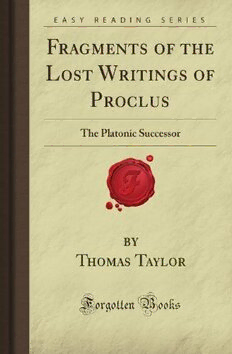Download Fragments of the Lost Writings of Proclus: The Platonic Successor PDF Free - Full Version
Download Fragments of the Lost Writings of Proclus: The Platonic Successor by Thomas Daa Taylor in PDF format completely FREE. No registration required, no payment needed. Get instant access to this valuable resource on PDFdrive.to!
About Fragments of the Lost Writings of Proclus: The Platonic Successor
Proclus Lycaeus (February 8, 412 - April 17, 485), surnamed ''The Successor'' or ''diadochos'' was a Greek Neoplatonist philosopher, one of the last major Classical philosophers (see Damascius). He set forth one of the most elaborate and fully developed systems of Neoplatonism. He stands near the end of the classical development of philosophy, and was very influential on Western Medieval Philosophy (Greek and Latin) as well as Islamic thought. (Quote from wikipedia.org) About the Author Thomas Taylor (1758 - 1835) Thomas Taylor (15 May 1758 - 1 November 1835) was an English translator and Neoplatonist, the first to translate into English the complete works of Aristotle and of Plato, as well as the Orphic fragments. The texts that he used had been edited since the 16th century, but were interrupted by lacunae; Taylor's thorough understanding of the Platonists informed his suggested emendations, which, when better manuscripts have been found, were often proved just. His translations were influential to William Blake, Percy Bysshe Shelley and William Wordsworth. In American editions they were read by Ralph Waldo Emerson, Bronson Alcott, and G.R.S. Mead, secretary of Mme Blavatsky the founder of Theosophy. He and his wife took Mary Wollstonecraft, into their home when she was an unhappy teenager, and thus influenced the future author of A Vindication of the Rights of Woman. (Quote from wikipedia.org) About the Publisher Forgotten Books is a publisher of historical writings, such as: Philosophy, Classics, Science, Religion, History, Folklore and Mythology. http://www.forgottenbooks.org
Detailed Information
| Author: | Thomas Daa Taylor |
|---|---|
| Publication Year: | 2008 |
| ISBN: | 9781606201657 |
| Pages: | 145 |
| Language: | English |
| File Size: | 2.839 |
| Format: | |
| Price: | FREE |
Safe & Secure Download - No registration required
Why Choose PDFdrive for Your Free Fragments of the Lost Writings of Proclus: The Platonic Successor Download?
- 100% Free: No hidden fees or subscriptions required for one book every day.
- No Registration: Immediate access is available without creating accounts for one book every day.
- Safe and Secure: Clean downloads without malware or viruses
- Multiple Formats: PDF, MOBI, Mpub,... optimized for all devices
- Educational Resource: Supporting knowledge sharing and learning
Frequently Asked Questions
Is it really free to download Fragments of the Lost Writings of Proclus: The Platonic Successor PDF?
Yes, on https://PDFdrive.to you can download Fragments of the Lost Writings of Proclus: The Platonic Successor by Thomas Daa Taylor completely free. We don't require any payment, subscription, or registration to access this PDF file. For 3 books every day.
How can I read Fragments of the Lost Writings of Proclus: The Platonic Successor on my mobile device?
After downloading Fragments of the Lost Writings of Proclus: The Platonic Successor PDF, you can open it with any PDF reader app on your phone or tablet. We recommend using Adobe Acrobat Reader, Apple Books, or Google Play Books for the best reading experience.
Is this the full version of Fragments of the Lost Writings of Proclus: The Platonic Successor?
Yes, this is the complete PDF version of Fragments of the Lost Writings of Proclus: The Platonic Successor by Thomas Daa Taylor. You will be able to read the entire content as in the printed version without missing any pages.
Is it legal to download Fragments of the Lost Writings of Proclus: The Platonic Successor PDF for free?
https://PDFdrive.to provides links to free educational resources available online. We do not store any files on our servers. Please be aware of copyright laws in your country before downloading.
The materials shared are intended for research, educational, and personal use in accordance with fair use principles.

